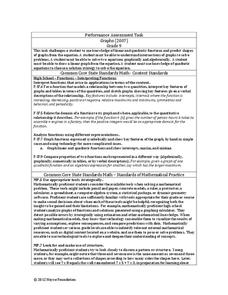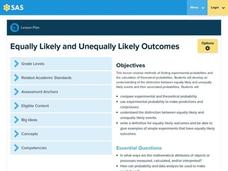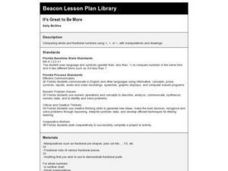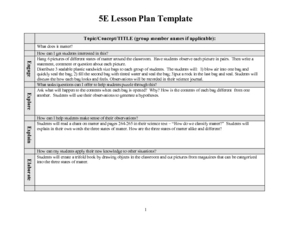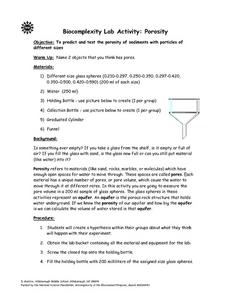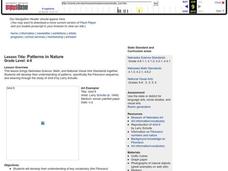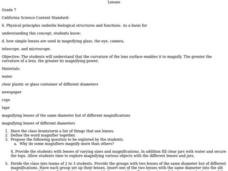Virginia Department of Education
Weather Patterns and Seasonal Changes
Get your class outside to observe their surroundings with a lesson highlighting weather patterns and seasonal changes. First, learners take a weather walk to survey how the weather affects animals, people, plants, and trees during...
Inside Mathematics
Graphs (2007)
Challenge the class to utilize their knowledge of linear and quadratic functions to determine the intersection of the parent quadratic graph and linear proportional graphs. Using the pattern for the solutions, individuals develop a...
Curated OER
More on Conduction and Convection
Why do some items feel colder when they are the same temperature? How should you keep your soda cold? What makes the wind blow? These are just some of the things middle schoolers discover when completing a lesson on...
Curated OER
Discovering Planet X
Students investigate the movements of the planet Pluto. Students participate in a hands-on activity to record data similar to the movements of the planet Pluto. Students compare their data to that found on a website.
Curated OER
Identifying Lines of Symmetry
Students calculate the lines of symmetry using polygons. In this geometry lesson, students graph, compare and estimate using collected data. They identify different attributes to the polygons based on their sides.
Curated OER
Studying Special Segments in Triangles
Students investigate special segments in triangles. In this geometry lesson plan, students graph, compare, estimate and predict findings based on their data. They differentiate between similarity and congruence of triangles.
Curated OER
Shapes Galore!
First graders create two-dimensional shapes. In this shapes lesson, 1st graders learn about different two-dimensional shapes. Students have many hands-on experiences with these shapes including the use of geoboards, shaving cream, yarn,...
Curated OER
Guess My Shape
Students describe shapes to other students who have to guess that shape. In this shape lesson plan, students describe shape attributes to other students. Then those other students have to guess the shape that is being described to them....
Pennsylvania Department of Education
Equally Likely and Unequally Likely Outcomes
Learners explore probability. In this statistics/probability lesson, students compare experimental and theoretical probability and use experimental probability to make predictions and conjectures. Learners explore the...
Curated OER
It's Great to Be More
Students compare whole and fractional numbers using <, >, or =, with manipulatives and drawings.
Curated OER
What Does It Matter?
Students define matter, the chemical properties of matter, and the physical properties of matter. They name physical and chemical properties of matter (by classifying using a Tree Map). Students determine the mass, volume, and density of...
Curated OER
What Does It Matter?
Learners match definitions with vocabulary words and learn basic facts about matter. Then, they see how to determine the physical characteristics of matter. They determine the mass, volume, and density of objects using appropriate tools...
Curated OER
Inertia
Young scholars conduct an experiment to apply Newton's first law of motion. They observe the inertia of an object in regard to its mass. The students record and graph the outcomes of their investigation and present the relationship...
Curated OER
Potential & Kinetic Energy
Young scholars test different sized marbles and how fast they can go. In this energy lesson plan, students test different sized marbles going down an incline. They predict which would have the most potential and kinetic energy. After the...
Curated OER
Porosity
Students predict and test the porosity of sediments with particles of different sizes. They name two objects that they think has pores. Students define the term porosity and pores. They comprehend that an aquifer is the porous rock...
Curated OER
Let's Measure
Learners discuss comparing the size of two different sets of blocks. They estimate the length of the long blocks by answering the following questions: How can you use the small blocks to find out?, and How many small blocks does it...
Curated OER
The Length of my Foot
Students review the concept of measuring length. In groups, they travel to various centers throughout the classroom. They experiment with using different objects to measure the length of items given to them by their teacher. They are...
Curated OER
Measuring Where We Sit In The Universe
Students investigate scientific measurement. They use a variety of scales to do the job and communicate the results correctly. The teacher uses socratic questioning throughout the lesson checking for comprehension. Students measure some...
Curated OER
Making a Fossilized Egg
Students explore fossils by participating in an in class experiment. In this archaeology instructional activity, students utilize dough and classroom objects to create fossil imprints after hiding the toy/fossil in the dough egg....
Curated OER
Patterns in Nature
Students learn about artist Larry Schulte and view examples of his work. They create addition sentence for the first seven numbers of the fibonacci sequence and use unifix cubes to build that sentences. Students color and create three...
Curated OER
What Can You See in the Sky?
In this objects in the sky activity, students will compare what they can see in the sky during the day and during the night. Students will complete 8 fill in the blank statements.
Curated OER
Standard Deviation
In this standard deviation worksheet, students solve and complete 10 different types of problems. First, they determine the number of standard deviations an item was from its mean. Then, students draw a model of what this would look...
Curated OER
Lenses
Students identify the different uses of lenses. In this physics lesson, students compare lenses with different magnifications. They record data and discuss results in class.

